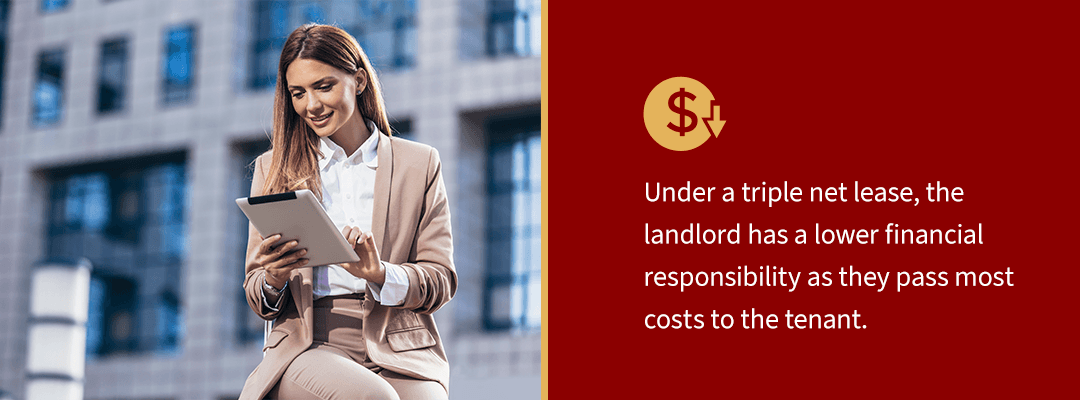What is a triple net commercial lease, and why is it essential to real estate investors? This guide discusses this popular concept in commercial lease arrangements to help you understand its pros and cons. Calabrese Law Associates has a team of private investment and real estate attorneys who help individuals and businesses resolve complex issues. Contact one of our attorneys if you need legal assistance urgently.
What Is a Triple Net Commercial Lease?
A triple net commercial lease or NNN is a type of lease agreement used in commercial real estate. In this arrangement, the tenant agrees to pay the base rent to the landlord and three primary expenses to the utility and service providers. These expenses are:
- Net property taxes: The tenant is responsible for paying the property taxes assessed.
- Net insurance: The tenant is responsible for the property’s insurance costs. The coverage usually includes liability and property insurance.
- Net maintenance: The tenant is responsible for maintenance and repair costs, including common area maintenance (CAM) fees.
Under a triple net lease, the landlord has a lower financial responsibility as they pass most costs to the tenant. In return, tenants usually pay lower base rates than other lease types. Additionally, triple net leases are typically long-term agreements and appeal to most investors because they can provide steady cash flow with less property management.
The Benefits of Triple Net Leases to Landlords
Triple net leases are advantageous to landlords in many ways. Here are some examples:
- Stable and predictable income stream: Triple net leases are usually long-term, meaning the landlord gets consistent income throughout the period. This stability is attractive for investors seeking reliable cash flow.
- Simplified financial planning: Since income is predictable, investors can better manage their finances and plan strategically, enabling them to forecast their cash flow more accurately.
- Reduced operating costs: Landlords have fewer operating costs because many of the financial obligations are transferred to the tenant, allowing investors to manage multiple properties with less hands-on involvement.
These benefits make triple net leases appealing to property owners looking to maximize investment returns while minimizing operational complexities.
The Potential Downsides of Triple Net Leases to Landlords
While triple net leases are beneficial, there are some potential downsides as well. These include:
- Limited control over property management: Triple net leases may not be ideal for investors who prefer greater control over managing their properties. Tenants handle most of the maintenance and repairs, but landlords may inspect periodically, subject to the terms of the contract. Also, significant alterations may require the landlord’s consent, especially if the contract permits.
- Potential for tenant default: Triple net leases impose higher financial burdens on tenants. If the tenant experiences economic challenges, expenses can accumulate at the end of the lease. Investors must do proper financial due diligence to ascertain the tenant’s ability to make the necessary payments.
- Long-term commitment: While long-term leases can provide stability, they also lock landlords into agreements with tenants for an extended duration. Landlords cannot easily replace tenants except on certain legal grounds. Thus, investors must draft the contract terms carefully to protect their interests.
To mitigate these potential risks, consider professional assistance. Private investment and real estate attorneys can advise and prepare proper contracts.
Risk Management in Triple Net Leases
Risk management is vital for every investor. For landlords considering triple net leases, the following could be helpful:
- Thorough tenant screening: Screen potential tenants thoroughly, examining their financial and personal backgrounds. You want someone who can afford the expenses and take good care of your property.
- Structured lease agreements: Prepare a comprehensive lease agreement with clear terms relating to repairs, maintenance, and payment obligations. Also, include specific clauses that define what constitutes a default and outline the sanctions.
- Enforcing tenant maintenance and repair obligations: Inspect the property periodically to ensure tenants fulfill their maintenance obligations. Where the tenant fails to maintain the property, you may direct them to do so or seek legal remedies.
- Legal preparedness: Work with a trusted attorney for ongoing legal support. Lawyers can assess situations and provide advice. They can also prepare contracts and guide you through eviction procedures where necessary.
Proactive risk management can protect your investment and contribute to long-term success in commercial real estate.
Legal Compliance and Triple Net Leases
As a landlord, you must ensure the lease agreements are enforceable and compliant with applicable regulations. Here are some critical considerations:
1. Understanding Lease Agreements
Lease agreements regulate the relationship between landlords and tenants. They define each party’s rights and obligations and serve as evidence of the transaction. Thus, knowing the terms and complying with them are essential to avoid legal consequences.
Learn important clauses like grounds for termination, notice requirements, and dispute resolution, and consult a lawyer if you need help understanding the technicalities. Knowing your rights also helps you determine when to take legal action to safeguard your interests. Remember to negotiate and review leases on a case-by-case basis, as a one-size-fits-all approach can create problems.
2. Learning Government Regulations
Pay attention to the local zoning laws and obtain permits and licenses to operate legally. Depending on the situation, you may be required to comply with other state and federal legislation related to accessibility, environmental protection, taxes, and safety. These laws apply to property ownership and management in general, and since you are investing in commercial real estate, you must adhere.
Legal compliance often requires professional assistance because it can be complex. Noncompliance may result in lawsuits and regulatory sanctions, which you want to reduce or prevent as an investor.
Why Trust Us?
Calabrese Law Associates helps individuals and businesses with their investment and real estate needs. We provide effective legal solutions, leveraging our industry experience and high-class resources. Our attorneys are well-trained and have handled many complex cases.
Our guiding principles center around legal excellence, efficiency, and client relations. We are committed to providing world-class legal services by setting high standards and developing innovative solutions. We are proactive and tenacious and implement practical strategies to help us achieve the desired results. We are responsive to our clients’ needs and aim to establish long-standing, mutually beneficial relations.
The lawyers at Calabrese Law Associates are ethical, direct, and honest. We care about our clients and dedicate time and attention to understanding each case. This strategy allows us to provide tailored legal solutions as we believe every case is unique. You can learn more about the firm by reading our client reviews and testimonials.
Get Help With Your Commercial Property Triple Net Lease
Triple net leases allow landlords to shift the majority of expenses to tenants. By doing so, investors can increase returns while reducing related costs. However, considering the potential risks of this arrangement, you must use the law to protect yourself and your business.
Calabrese Law Associates has real estate and private investment attorneys who know the Massachusetts laws. We can help you review and draft contracts and represent you in resolving disputes. We also provide ongoing legal consultation to ensure you are making informed decisions. Our lawyers are ready to assist. Contact us now!
This publication and its contents are not to be construed as legal advice nor a recommendation to you as to how to proceed. Please consult with a local licensed attorney directly before taking any action that could have legal consequences. This publication and its content do not create an attorney-client relationship and are being provided for general informational purposes only.
Attorney Advertising. Prior results do not guarantee a similar outcome.





